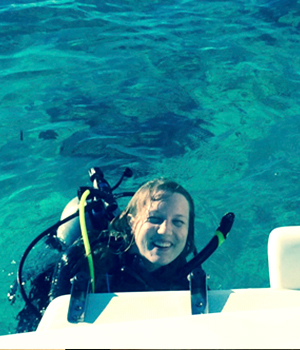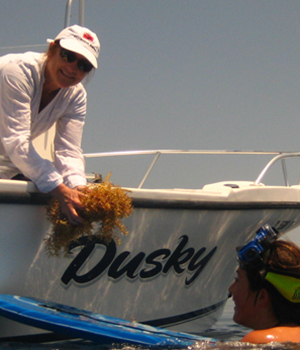Marguerite Koch-Rose
Education
- Ph.D., University of Miami Rosenstiel School of Marine and Atmospheric Science (RSMAS), 1996
Research Interests
- Primary productivity of tropical marine ecosystems
- Climate change (elevated temperature, salinity and pCO2) effects on tropical marine autotrophs
- Stress responses and adaptation to stress in tropical marine autotrophs (macroalgae, seagrass, mangrove)
- Biogeochemistry and nutrient cycling in tropical carbonate ecosystems
Research Description
Our research is on nutrient cycling and primary production in tropical marine ecosystems and stressors that influence tropical seagrass, mangrove and algal communities. We are currently focused on climate change effects, including elevated temperature, salinity and pCO2, termed “ocean acidification”, on marine plant and macroalgal communities. We hypothesize that ocean acidification and elevated temperature affect photosynthesis, growth and calcification in tropical reef macroalgae with far-reaching ecological consequences. However, diverse pathways of inorganic carbon acquisition for photosynthesis and mechanisms of calcification may provide resistance to elevated ocean pCO2 in calcifying macroalgae. In addition, we are elucidating mechanisms causing seagrass mortality in Florida Bay, relevant to lagoons and estuaries world-wide.
Our research approach is to examine stress responses from the physiological to ecological scale, consider species life history, and focus on ecosystem-level indicators of stress, such as hypoxia and eutrophication. We are also interested in biogeochemical changes that destabilize foundation plant communities and thereby influence the sustainability of marine ecosystems. The majority of our work is in shallow tropical carbonate environments (lagoons and reefs) of South Florida, The Bahamas and wider Caribbean. We typically take an experimental approach to examine alternative hypotheses in mesocosms and field settings.
Recent Publications
-
Koch, M.S., McNicholl, C., Manfrino, C. Lapointe. (2023) Stable carbon and oxygen isotopes indicate photophysiology and calcification mechanisms of macroalgae on Little Cayman Island reefs. Journal of Applied Phycology. https://doi.org/10.1007/s10811-023-03079-9 pg 1-11.
-
Koch, M.S., C. R. Johnson, L. Travis, O. Pedersen, C. J. Madden. (2022) Hypersalinity effects on O2
flux across the diffusive boundary layer of leaves in the tropical seagrass
Thalassia testudinum
Journal of Experimental Marine Biology and Ecology. 555: 1-8. https://doi.org/10.1016/j.jembe.2022.151780.
-
Koch, M.S., C. R. Johnson, C. J. Madden, O. Pedersen. (2022) Low irradiance disrupts the internal O2
dynamics of seagrass (Thalassia testudinum) leading to shoot meristem H2S intrusion. Aquatic Botany 181: 1-11. https://doi.org/10.1016/j.aquabot.2022.103532
-
Koch, M.S., C. R. Johnson, C. J. Madden, O. Pedersen. (2022) Irradiance, Water Column O2
, and Tide Drive Internal O2
Dynamics and Meristem H2S Detection in the Dominant Caribbean‐Tropical Atlantic Seagrass, Thalassia testudinum. Estuaries and Coasts. https://doi.org/10.1007/s12237-022-01064-y
-
Strazisar, T., Koch, M., Madden, C. (2021) Abiotic and Biotic Interactions Control
Ruppia maritima
Life history development within a heterogeneous coastal landscape. Estuaries and Coasts. 44, pages1975–1993.
-
C. McNicholl, M. S. Koch,
Swarzenski, P.W., Oberhaensli, F.R., Taylor A., Gomez Batista, M., Metian M.
(2020) Ocean acidification effects on calcification and dissolution in tropical reef macroalgae. Coral Reefs 39, pages1635–1647 https://doi.org/10.1007/s00338-020-01991-x
-
C. McNicholl, M. S. Koch,
Hofmann, L.C.
(2019) Photosynthesis and light-dependent proton pumps increase boundary layer pH in tropical macroalgae: A proposed mechanism to sustain calcification under ocean acidification. Journal Experimental Marine Biology and Ecology. https://doi.org/10.1016/j.jembe.2020.151489
-
Johnson, M. S. Koch, O. Pedersen and C. J. Madden (2020)
Hypersalinity affects leaf and meristem O2
dynamics exposing meristems to H2S in the dominant tropical seagrass
Thalassia
testudinum.
Journal Experimental Marine Biology and Ecology. 533:1-10. https://doi.org/10.1016/j.jembe.2020.151458
-
Andersson, A.J, Venn, A.A., Pendleton, L., Brathwaite, A., Camp, E.F., Colley, S. Gledhill, D., Koch, M., Maliki, S., Manfrino, C. 2019. Ecological and socioeconomic strategies to sustain Caribbean coral reefs in a high-CO2
world. Regional Studies in Marine Science. 29:1-13.
-
Johnson, M. S. Koch, O. Pedersen and C. J. Madden (2018) Hypersalinity as a trigger of seagrass (Thalassia testudinum) die-off events in Florida Bay: Evidence based on shoot meristem O2
and H2S dynamics. Journal Experimental Marine Biology and Ecology. 504:47-52. https://doi.org/10.1016/j.jembe.2018.03.007
-
Zweng, R.C., Koch, M.S., Bowes, G. (2018). The role of irradiance and C-use strategies in tropical macroalgae photosynthetic response to ocean acidification.
Scientific Reports
. https://doi.org/10.1038/s41598-018-27333-0
-
Morey, S., Koch, M., Liu, Y., Lee, SK. (2017) Chapter 7 Florida’s Oceans and Marine Habitats in a Changing Climate. In (eds. Chassignet, E., Jones, J., Misra, V., Mitchum, G., Obeysekera) Florida’s Climate: Changes, Variations & Impacts. University Press of Florida, Gainesville, FL.
-
Peach, K.E., Koch, M.S.,
Blackwelder, P.L., Kamasawa, N., Guerrero-Given, D.
(2017)
Primary utricle structure of six
Halimeda
species and potential relevance for ocean acidification tolerance. Botanica Marina 60(1): https://doi.org/10.1515/bot-2016-0055
-
Peach, K.E., Koch, M.S., Blackwelder, P.L., Manfrino, C. J. (2016) Calcification and photophysiology responses to elevated
pCO2
in six
Halimeda
species from contrasting irradiance environments on Little Cayman Island reefs. Exp. Mar. Bio. Ecol. 486, 114-126, https://doi.org/10.1016/j.jembe.2016.09.008
-
Strazisar, T., Koch, M., Madden, C. (2016) The importance of recurrent reproductive events for
Ruppia maritima
seed bank viability in a highly variable estuary: the Everglades-Florida Bay ecotone. Journal of Aquatic Botany https://doi.org/10.1016/j.aquabot.2016.07.005
-
Hofmann, L.C., Koch, M.S., de Beer, D. (2016) Evidence for biotic control of diffusive boundary layer pH and active Ca2+
flux mechanisms in a tropical crustose coralline alga. PLOS ONE https://doi.org/10.1371/journal.pone.0159057
-
Bedwell, H., Joles, L., Koch, M.S., Peach, K., Dutra, E., Manfrino, C. (2016) The role of in hospite zooxanthellae photophysiology and reef chemistry on elevated
pCO2
effects in two branching Caribbean corals:
Acropora cervicornis
and
Porites divaricata
.
ICES Journal of Marine Science https://doi.org/10.1093/icesjms/fsw026
-
Koch, M. S. (2016) The significance of warming seas for species and ecosystems: Impacts and effects on seagrasses. In (eds. Laffoley, D., Baxter, J.M.) Explaining Ocean Warming: Causes, scale, effects and consequences. IUCN-International Union for Conservation of Nature and Natural Resources Report. IUCN, Gland, Switzerland. 456 pp.
-
Peach, K.E., Koch, M.S., Blackwelder, P. (2016) Effects of elevated
pCO2
and irradiance on growth, photosynthesis and calcification in
Halimeda discoidea
Marine Ecology Progress Series 01/2016; https://doi.org/10.3354/meps11591.
-
Dutra, E., Koch, M., Peach, K., Manfrino, C. (2015) Tropical crustose coralline algal individual and community responses to elevated
pCO2
under high and low irradiance. ICES Journal of Marine Science; https://doi.org/10.1093/icesjms/fsv213.
-
Koch, M.S., C. Coronado, M.W. Miller, D.T. Rudnick, E. Stabenau, R.B. Halley, F.H. Sklar (2014) Climate Change Projected Effects on Coastal Foundation Communities of the Greater Everglades using a 2060 Scenario: Need for a New Management Paradigm. Journal of Environmental Management. https://doi.org/10.1007/s00267-014-0375-y
-
Strazisar, T., Koch, M., Madden, C. Seagrass (
Ruppia maritima
L.) (2014) Life history transitions in response to salinity dynamics along the Everglades-Florida Bay ecotone Estuaries and Coasts https://doi.org/10.1007/s12237-014-9807-4.
-
Strazisar, T., Koch, M., Madden, C., Filina, J., Lara, Pedro, U. and Mattair, A. (2013) Salinity effects on
Ruppia maritima
L. seed germination and seedling survival at the Everglades-Florida Bay ecotone Journal of Experimental Marine Biology and Ecology 44: 5129–139.
-
Strazisar, T., Koch, M., Dutra, E., Madden, C.
(2013)
Ruppia maritima
L. seed bank viability at the Everglades-Florida Bay ecotone Aquatic Botany 111 26–34.
-
Koch, M., Bowes, G., Ross, C., Zhang, Xing-Hai. (2013 electronic; 2014 print) Climate change and ocean acidification effects on seagrasses and marine macroalgae. Review: Global Change Biology 19, 103–132, doi: 10.1111/j.1365-2486.2012.02791.x
-
Iz, B.H., Berry, L., and Koch M. (2012) Modeling regional sea level rise using local tide gauge data. Geodetic Science DOI: 10.2478/v10156-011-0039-2.
-
Holmer, M., Pedersen, O., Krause-Jensen, D. Olesen, B. Petersen, M.H., Schopmeyer, S., Koch, M., Lomstein, B., Jensen, H.S. (2009) Sulfide intrusion in the tropical seagrasses
Thalassia testudinum
and
Syringodium filiforme
. Estuarine and Coastal Shelf Science.
85: 319–326.
-
Jensen, H.J., Nielsen, O.I., Koch, M.S. (2009) Phosphorus release with carbonate dissolution coupled to sulfide oxidation in Florida Bay seagrass sediments.
Limnology and Oceanography.
54(5): 1753–1764.
-
Koch, M.S., Kletou, D.C., Tursi, R. (2009) Alkaline phosphatase activity of water column fractions and seagrass in a tropical carbonate estuary, Florida Bay.
Coastal Estuarine and Shelf Science
. 83: 403–413.
-
Rosch, K. and Koch, M.S. (2009) Seagrass (Thalassia testudinum) nutrient recycling along a trophic gradient in Florida Bay.
Bulletin of Marine Science
84(1): 1–24.
-
Nielsen, O. I., M.S. Koch, C.J. Madden (2007) Inorganic phosphorus uptake in a carbonate-dominated seagrass ecosystem.
Estuaries and Coasts
30(5):827-839.
-
Koch, M.S., Schopmeyer, S.A., Nielsen, O.I., Kyhn-Hansen, C., Madden, C.J (2007) Conceptual model of seagrass die-off in Florida Bay: Links to biogeochemical processes. 350:73-88.
Journal of Experimental Marine Biology and Ecology
.
-
Koch, M.S., Schopmeyer, S.A., Holmer, M. Madden, C.J., Kyhn-Hansen, C. (2007)
Thalassia testudinum
response to the interactive stressors hypersalinity, sulfide and hypoxia.
Aquatic Botany
87:104-110.
-
Koch, M.S., Schopmeyer, S.A., Kyhn-Hansen, C., Madden, C.J. (2007) Synergistic effects of high temperature and sulfide on tropical seagrass.
Journal of Experimental Marine Biology and Ecology
341:91-101.
-
Koch, M.S., Schopmeyer, S.A., Kyhn-Hansen, C., Madden, C.J., Peters, J.S. (2007) Tropical seagrass species tolerance to hypersalinity stress.
Aquatic Botany
86:14-24.
-
Nielsen, O. I., M.S. Koch, H.S. Jensen, C.J. Madden (2006)
Thalassia testudinum
phosphate uptake kinetics at low in situ concentrations using a
33
P radioisotope technique.
Limnology and Oceanography 51: 208-217
.
-
Kieckbusch, D. and M.S. Koch (2004) Trophic linkages of primary producers and consumers in fringing mangroves of tropical lagoons.
Bulletin of Marine Science
74(2):271-285.
-
Gras, A. and M.S. Koch (2003) Phosphorus uptake kinetics in the tropical seagrass
Thalassia testudinum
.
Aquatic Botany
76:299-315.
-
Koch, M. S. and J. M. Erskine (2001) Sulfide as a phytotoxin to the tropical seagrass,
Thalassia testudinum
: Interactions with high salinity and temperature.
Journal of Experimental Marine Biology and Ecology
266:81-95.
-
Koch, M. S., and C. Madden (2001) Patterns of primary production and nutrient availability in a fringing mangrove tropical lagoon in the Bahamas.
Marine Ecology Progress Series
219:109-119.
-
Koch, M. S., R. Benz, D. Rudnick (2001) Solid-phase phosphorus pools in highly organic carbonate sediments of northeastern Florida Bay.
Estuarine and Coastal Shelf Science
52:279-291.
-
Erskine, J. M. and M. S. Koch (2000) Sulfide effects on
Thalassia testudinum
carbon balance and adenylate energy charge.
Aquatic Botany
67:275-285.
Scholarly Activities
Job Postings
-
Postdoctoral Scholar Position: Ecological Modeler
-
PhD Assistantship: Geospatial Analysis in Ecological Seagrass Research
-
PhD Assistantship: Microbial Ecology Research




